Comment to: „The Biggest Story of the Century Needs More Coverage“ by James Fahn on 2018-11-15 in the blog of Scientific American https://blogs.scientificamerican.com/observations/the-biggest-story-of-the-century-needs-more-coverage/
Dear James,
thanks for sharing your article in Scientific American.
Unfortunately there is no comment function under your article. So I choose this way to comment.
Honest, often, open – and transparent
Rightly you write that „journalists have a responsibility to be honest about our planetary prospects, and to report as often and openly as possible about climate change.“
Despite the fact, that publishers and other media have a much greater responsibility to increase climate and climate policy reporting, it is not honest and not open to frighten people with phrases like „planetary catastrophe“. There will be no doomsday on the day we reach 1.5 degrees C (or 2 degrees C). There will not even be „a single 1.5 degree C world“, as the IPCC authors stress in their special report 15 (SR15), as well as „there is no single answer to the question of whether it is feasible to limit warming to 1.5°C and adapt to the consequences“.
What openness and transparency mean
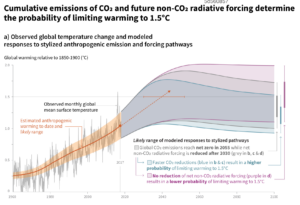
Source: IPCC Special Report on Global Warming of 1.5°C
It should be part of honest and open reporting to tell people, that the 1.5°C level may be passed already in 2025 according to the model calculations in IPCC SR15, but likely some time between 2030 and 2055. This means, that the earth will not perish in 2040.
In my opinion it is misleading to tell people that climate change cost „the planetary economy an estimated $54 trillion“.
It is perverse, but true: every war, every catastrophe increases the GDP at least of a richer country, creates jobs, and lets the economy roll. Just look at hurricane Katrina 2005 which helped considerably that the construction businesses in Louisiana flourish.
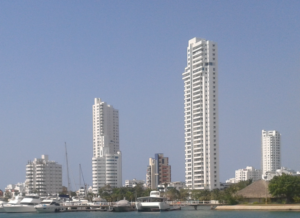
Foto: Neubert
On the other hand, villas and mansions of wealthy families on beaches, luxury office sky scrapers, or inadequately secured construction sites in the rich countries add disproportionally to the price tag. Whereas the death toll paid by the poor is not included. Economic costs contribute nothing to stories about climate issues. They are only important for insurances.
Do not connect things where there is no connection
Another thing: Many of my fellow journalists irresponsibly connect climate change in their stories with the wild fires in the California, Europe and Russia this year. Why did no one explain people that the global area burned appears to have overall declined over past decades, and that there is increasing evidence that there is less fire in the global landscape today than centuries ago! Misleading stories tend to foster availability cascades, leading to false decisions in the end.
You mention the US and Brazilian climate deniers. Well, there are many more of such figures in governments and administrations around the world. But it worries me much more that climate polluters occupy positions as directors in environmental organisations like Erik Solheim of the United Nations Environment Programme (UNEP). You did not mention him, and Margaret Sullivan, who’s article you linked in your piece[ref]Margaret Sullivan (2018-10-08): The planet is on a fast path to destruction. The media must cover this like it’s the only story that matters. The Washington Post. www.washingtonpost.com[/ref], even quotes him uncritically. He spent nearly half a million USD within 3 years just for travelling – usually by plane. Fortunately he left his job now.
Do not mourn: Our civilisation is not compatible with nature
You mention Margaret Sullivan’s piece in the Washington Post as: she „explains quite eloquently that our civilisation may be at stake“. Although I cannot interpret her column the same way, it may be true that our civilisation is at stake.
But what does that mean? Scientifically seen, it means that our civilisation is not compatible with nature. In the past we thought that nature is not compatible with our civilisation and we did everything to make nature compatible – with the results we experience today and will experience in the near future. So we need not to mourn our civilisation, better say good bye to it and find a new one.
Admittedly our civilisation has been quite successful in solving human and societal problems. Between 1990 and 2015 the number of people living in extreme poverty has declined by more than half, the proportion of undernourished people in the developing regions has fallen by almost half, the working middle class has almost tripled, child mortality rate has declined by more than half, more than 90 per cent of the global population can use an improved drinking water source today, terrestrial and marine protected areas in many regions have increased substantially (in Latin America and the Caribbean it rose from 8.8 per cent to 23.4 per cent).[ref]UN Millennium Developing Goals 2015[/ref]
However, the poorest and most vulnerable people are still left behind and millions of poor people still live in poverty and hunger, without access to basic services.
Successes for humanity and societies built on CO2
But it is important to tell openly, that the past successes for humanity and societies are built on ever increasing carbon dioxide emissions, which are incompatible with nature.
Thus we cannot avoid that our civilisation will be gone one day making room for a new civilisation. I fear that just changing our existing civilisation will not be enough. The question is: Can we do it now, as long as we have the freedom of choices (democracy), or do we wait until we have no choice at all when nature (and thus physical law) overtakes?
As journalists we have to tell people the full truth, including the options we have, and the options we do not have. Physics will leave us no options. Mathematical models deliver projections, but no predictions or forecasts. That is a very important difference to be considered in all our reporting and stories, but it is too often neglected!
Telling about options within physical boundaries
Therefore we should put more focus on the variables and the uncertainties which climate models produce in order to force our governments to take the right decisions.
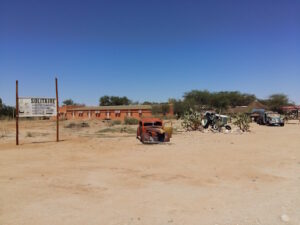
Foto: Neubert
For example, just switching from dirty to clean energy in our home country (in my case Germany) is by far not enough. We have to take the carbon footprints into consideration, which our consumer products create in other countries (e.g. China). The increased production of solar and wind power units added considerably to the carbon dioxide accumulation in the atmosphere, and finite resources have been deleted, like Cobalt, Neodym, Indium, Gallium, Tellur, Selen, and others (many from DR Congo!), but also Silver, Aluminium and Copper. Probably it is time to switch off the lights, to scrap our cars (even the electric ones), to ban blockchains (Bitcoin and the like).
For stories about our options for adaption and mitigation such information are of course parts of openness and transparency.
However, it is increasingly possible to attribute weather disasters to climate physics. This research gives us increasingly better tools to convince courts in order to doom governments and administrations. Why do we widely ignore such attempts in our journalism? Such tools are able to empower people and organisations!
Gain more knowledge
My impression after more than 30 years in science journalism is that the knowledge base in physics and mathematics especially within environmental and climate journalism is eroding and replaced by advocacy communication. Having knowledge in biology, ecology is not enough. Even when reporting about climate court rulings, a solid understanding of physics, chemistry and mathematics is inevitable because they are also foundational in lawsuits.
It does not help to grumble and paint doomsday pictures which journalists falsely repeat over and over again. Instead it should be part of an open, comprising, transparent and critical journalism to show the physical options and the borders of our earth system on one side, and the societal actions on the other side in order to help our audiences to find the right tracks and balances, avoiding biases.
Flying by plane to the coming Climate Conference: Shame on you
Finally: I wonder how many journalists and delegates from Europe will take the train or the bus when going to the Climate Conference in Katowice in Poland, which starts in a few days. Katowice is quite in the centre of Europe and very easy to reach by train mostly in less than a day.
Probably many delegates from Sweden will prefer public sea-ground transport, as is becoming a fashion in Sweden, not to fly. Swedes nowadays feel ashamed when they have to admit that they took an airplane (#flygskam). There are even ministers who take the train to Brussels, about 1,500 kilometres away. From my own experience I can say that it is quite comfortable to work on the train. But how did such awareness rose among the citizens in a country? Interesting question…
All the best
/ Hajo
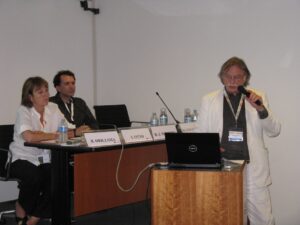


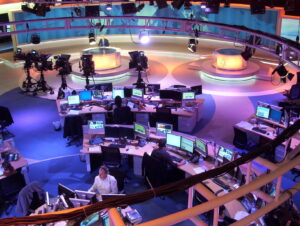


 Hanns-J. Neubert was organiser and speaker at
Hanns-J. Neubert was organiser and speaker at